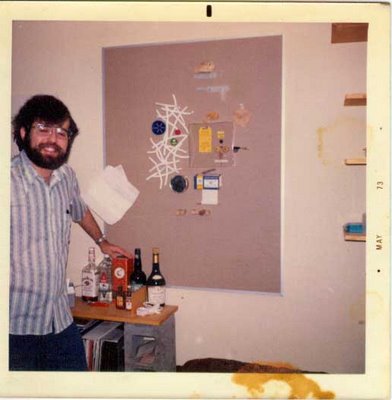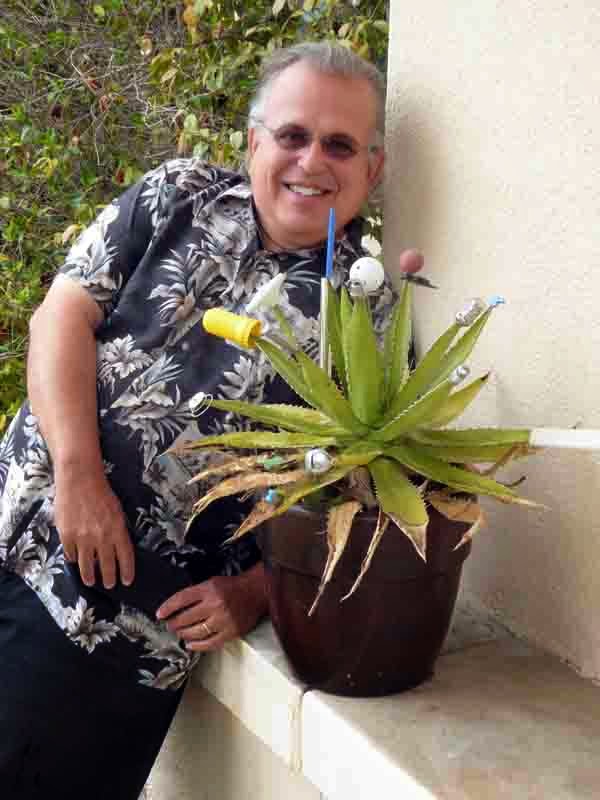On the left is David Ocker in the year 1972, age twenty. On the right is David Ocker in 2015, age you-figure-it-out. David 1972 and David 2015 worked together to complete a new piece entitled Life Time. It only took them 43 years to finish it. Listen to it here.
For a while David 1972 kept a list of his "Completed Works". David 2015 still has it. The first piece on the list was "Dance Suite for Piano". The second piece was a trio for piano, clarinet and tuba. (No, really. I had two roommates in my Junior year of college - one was a pianist, the other a tubist. And I was a clarinetist. There's a word for that sort of thing.)
Piece number three on the list was a piano sonata. David 1972 called it Sonata. There were three movements:
The first movement marked "very fast and loud" was dated May 1972.
The second movement, called "trivially (no so fast)*", was dated June 1972. [The tempo marking continued in a footnote at the bottom of the page: "* Andante?"]
The final movement, Allegro Moderato, was finished in July 1972.
It is significant that it took three months to compose this piece.
I do remember that at one point my pianist roommate hesitantly read through the first movement for me. Since then no one has ever performed Sonata because no one has ever known about it. Also because it's not a very good piece.
At some point within a decade or two I completely forgot that Sonata even existed. How do you pinpoint the exact moment when you forget something?
Flash Forward to December of last year. The scene: David's office. Begin David 2015's voiceover:
It was December 2014. I was close to finishing my piece Autumn 2014, yet another installment in The Seasons. I needed an idea for the upcoming season, Winter 2014.
Meanwhile, a large stack of plastic storage boxes cluttered my office. One of these was filled with old manuscripts, composition notebooks and other vestiges of my early musical creativity. I resolved to move them to a place where I wouldn't see them every day.
Jolted by a bolt of nostalgia, I peered inside of one.
There I found strange, oddly familiar papers. They weren't particularly dusty or musty, just old. Artifacts from my life.
One particular manuscript caught my attention. At the top it said only "Sonata". Did I write this music, I wondered. It was in my handwriting. I found my post-adolescent signature on the last page along with the date "7/72". I wracked my brain to remember what this was.
As I listened to bits of the music in my head, familiarity slowly increased. That's probably the moment when I hatched my plan: I would use this music, one of my first ever attempts at composition, as the basis for the upcoming Season.
The process began formally on December 21, 2014. That was the Solstice, the beginning of winter. I used the first measures of Sonata as source material for the first fragment of Winter 2014. The next day I worked the next few bars into the second fragment. The process continued more or less daily.
If you are one of the three regular Mixed Meters readers, someone already familiar with how The Seasons works, feel free to skip the rest of this paragraph. I compose a little bit of music for every day in the calendar. I try to compose it on the day itself, but it's no big deal to skip a day and write two fragments tomorrow. I present these fragments in two formats: the Long Version (each fragment is separated by a silence, lots of silence; the ratio is about 4 to 1 silence to music) and the Short Version (the silences are removed to reveal an actual musical composition underneath.) David Ocker 2011 was the guy who hatched this plan. It's now in its fourth year. Still going strong.
On March 19, 2015, I wrote the last fragment of Winter 2014. I managed, through careful planning (and blind dumb luck) to divide Sonata into exactly the same number of sections as there are days in a season. The fragment of the final day uses the last two measures of the earlier piece.
In fact the last fragment is identical to those last two bars. It's the only fragment where I used earlier music without changing it. All the rest of the piano music was re-scored for the Peter Schmid Quartet, guitar, piano, bass and drums. Those guys are such talented musicians that they always know instinctively just exactly what I'm thinking. Uncanny.
You're probably still wondering why I said it was significant that David 1972 took about three months to write Sonata.
It's significant because it took David 2015 the same amount of time to finish Winter 2014.
I named the short version Life Time. That's Winter 2014 with the silences removed. The title is supposed to reflect the nearly 43 years between the first three months in 1972 and the last three months, mostly in 2015.
Forty-three years is just about two thirds of my life so far. When I'm 86 years old the fraction will have dropped to half. I should be so lucky.
Click here to hear Life Time (Winter 2014 short version) by David Ocker - 814 seconds - Copyright © 2015 by David Ocker
Winter 2014, the long version of Life Time, lasts 4232 seconds. You can listen to it or read about it. Or both.
Links to all The Seasons by David Ocker, both long and short versions, both audible and readable, are here.
If you're curious how much of Life Time was written by David 1972 and how much by David 2015, I scanned the original piano manuscript for you to study. Download the Sonata (1972) in pdf format here.
A tangentially relevant Mixed Meters post/rant from 2007: Sonata Heaven.



No comments :
Post a Comment